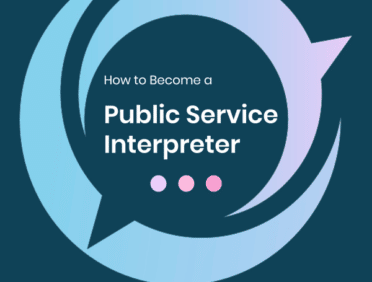Start Your Career as a Well Paid UK Interpreter
Are you fluent in two or more languages and looking for a rewarding and well-paid career in the UK? If so, becoming an interpreter could be a great option for you. Interpreters are in high demand in the UK, and they play a vital role in facilitating communication between individuals who speak different languages. In this article, we’ll explore what it takes to become an interpreter, the different types of interpreting, and the job opportunities available.
Am I fluent in two or more languages?
The first requirement for becoming an interpreter is fluency in two or more languages and in the UK, one of those languages must be English. It’s important to note that fluency goes beyond simply being able to speak the language; it requires a deep understanding of the language and the ability to interpret effectively. You’ll need to have an excellent command of both your source (the language the communication is being interpreted from – usually English) and target (the language you are interpreting into) language. As a general rule, interpreters at Level 3 should be fluent in both languages at a minimum B2 or above on the Common European Framework for Languages (CEFR). Interpreters at level 6 are expected to be at level C2 or above for both languages.
How do I become an interpreter?
To become an interpreter in the UK, there are a few steps you’ll need to take. The following represent the typical steps that interpreters need to follow to start a successful career:
Qualifications
Although it is still possible to find limited interpreting work without any qualifications, it is getting more and more difficult for interpreters to work without a qualification and rightly so. Interpreters who have never been through any formal training and proved their competence are often following incorrect procedures or do not have the terminology knowledge to do an efficient job, and this puts those they ‘interpret’ for in danger.
Prerequisite Requirements
Most interpreting agencies require that you have a minimum of a Level 3 Qualification in Community Interpreting, which is provided by many further education providers, including Learn Q. As mentioned, you will need to speak English plus another language fluently and in some cases you will need interpreting experience. To start at Level 3 you will not need any particular qualifications as it is an entry level qualification.
To be a successful interpreter, you’ll need to have excellent communication and interpersonal skills. You’ll also need to be able to work well under pressure, as interpreting can be a fast-paced and demanding job. You’ll need to have a deep understanding of both the languages you’ll be interpreting and the cultures of the individuals you’ll be working with. You will also need a solid knowledge of the specialisms that you will be working in; including the most common terminology in both languages. You often need to put in unpaid hours building your knowledge. Additionally, you’ll need to be able to adapt your communication style to suit the needs of different clients and situations.
In this section, we will be looking at the most used interpreting techniques for public service interpreters: face-to-face (F2F), telephone interpreting (TI) and video remote interpreting (VRI).
Face-to-face interpreting
Face to face interpreting occurs in a specific location; for instance, a hospital, court, a home or within a business’ premises. The client/ Service Provider (doctor or police officer), the Limited English Speaker(s) (LES) / Service User and the interpreter are all present in the same location. F2F interpreting can be either consecutive or carried out via TI or VRI.
Telephone interpreting
Telephone interpreting is completed remotely with the interpreter joining a conversation via a telephone. Often the client and LES are together in a physical location (e.g., a hospital or Job Centre) while the interpreter is at home, or in a call centre. Telephone interpreting is always consecutive (see below).
Video-link interpreting
Video remote interpreting is also completed remotely with the interpreter joining the conversation via a secure Internet video link. In most cases the client and LES are in the same location (e.g., a police station) and the interpreter joins either from home, or from a centralised client or LSP location specifically for that purpose.
On-Demand Interpreting
On-demand, or ad-hoc, interpreting refers to interpreting assignments that are not pre-booked and in most cases uses technology to provide instant interpreting services. This type of interpreting is often used in emergency situations, when an interpreter is not available in person or increasingly simply as a more cost effective and more convenient solution.
Modes of Interpreting
Interpreters can specialise in various modes of interpreting to handle different situations. The more modes an interpreter is proficient in, the more diverse assignments they can undertake. If you aim to obtain an interpreting qualification, choosing a higher level requires you to demonstrate more modes of interpreting.
Consecutive Interpreting
Consecutive interpreting is typically the first mode that interpreters learn, as it is required for almost all interpreting assignments.
Sight Translation
The next common mode is sight translation from English, while sight translation to English is usually the subsequent skill learned.
Simultaneous Interpreting
Simultaneous interpreting is one of the most challenging modes and is frequently used in specific settings such as courtrooms, conferences, or mental health interpreting assignments.
Lastly, written translation to and from English is predominantly used in court assignments. This differs to the translation a professional translator will produce but there are also similarities.
As an interpreter, your daily tasks will vary depending on the type of interpreting you’re doing and the environment you’re working in. Some common tasks include:
Interpreting conversations between individuals who speak different languages
Preparing for interpreting assignments by researching the topics and relevant terminology.
Adapting your communication style to suit the needs of different clients and situations
Providing cultural guidance to help individuals better understand each other
Maintaining accurate records of interpreting assignments
Having a good working knowledge of, and adhering to, an Interpreter Code of Conduct such as the National Register of Public Service Interpreters (NRPSI) Code of Conduct
Training
In the UK, there are several training and career development options for aspiring interpreters. Some of the common routes to become an interpreter include:
Training and Career Development
Taking a certificate or diploma in interpreting: Several organisations offer interpreting qualifications, such as the Level 3 Qualification in Community Interpreting where most interpreters start their career, or the more advanced Diploma in Public Service Interpreting (DPSI) (only suitable for highly experienced interpreters). These courses are often more practical and focus on interpreting in specific contexts, such as healthcare or legal settings.
Taking a degree in interpreting: Many universities offer undergraduate or postgraduate degrees in interpreting. These courses usually cover a range of interpreting skills, such as consecutive and simultaneous interpreting, and also provide training in the use of interpreting equipment.
Volunteering: Volunteering as an interpreter can be a great way to gain experience and build your skills. Many voluntary organisations and charities require interpreters for their work with non-English speaking communities. Due to the risks presented to service users, it is not advisable to offer interpreting services without undertaking formal training such as the Learn Q ‘How to be an interpreter’ course or following a training manual such as the ‘How to become a Public Service Interpreter’ ebook.
Work experience: Some interpreters start their careers as bilingual support workers or language tutors, gaining experience in communication and language skills, before obtaining a relevant interpreting qualification such as the Level 3 Qualification in Community Interpreting.
Career Development
Once you have gained some experience as an interpreter, you may want to consider further career development. This could include:
Specialising in a particular area of interpreting: As an interpreter, you could choose to specialise in a particular area, such as legal or medical interpreting. Specialising can help you to develop specific skills and knowledge in your chosen field and can make you more attractive to potential employers.
Professional development: Professional development is essential for interpreters to keep their skills up to date and to maintain their professional status. This could involve attending training courses or workshops, networking with other interpreters, joining a professional association, or simply completing solo research.
Becoming a trainer, assessor or mentor: Once you have established yourself as an experienced interpreter, you could consider passing on your knowledge and skills by becoming a trainer, assessor or mentor.
Job Opportunities
There are a range of job opportunities available for interpreters in the UK, both in the public and private sector. Some of the common industries that require interpreting services include:
Healthcare, including NHS: Interpreters are often required in healthcare settings to communicate with patients who do not speak English. This could include hospitals, clinics, dentists, and community health centres.
Government: Interpreters may be required in government settings, such as immigration, welfare, housing, and social services, to communicate with non-English speaking individuals.
Legal: Interpreters are often required in legal settings, such as courts, police, probation or law firms, to help non-English speaking individuals understand legal proceedings.
Business: Interpreters are often used in business settings, such as meetings or conferences, to help facilitate communication between international clients or partners.
Media: Interpreters may be required in media settings, such as television or radio, to provide interpreting services for news or current affairs programmes.
As an interpreter, you may choose to work as a freelancer or for a specific organisation. Freelance interpreters are more common, often work on a self-employed basis and are paid by the minute (for TI and VRI), by the hour (F2F) or per job (this can depend on the service provider). Organisations, particularly public services, that require interpreting services mainly use agency services but may also employ interpreters directly.
Conclusion
Becoming an interpreter in the UK can be a rewarding and well-paid career choice for those who are fluent in two or more languages. Interpreting requires a range of skills, including strong communication skills, cultural awareness, and the ability to work under pressure. There are several routes to become an interpreter, including gaining a certificate, degree or diploma in interpreting, plus volunteering, or gaining work experience can also be helpful provided you are safe to practice. Interpreting can be a challenging but fulfilling career, with opportunities to work in a range of settings, including healthcare, legal, business, government, and media.
To download a .pdf of this blog, please click here












